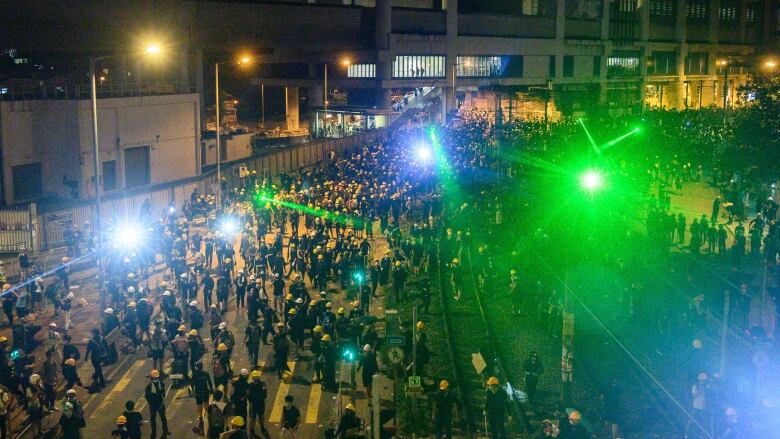Hong Kong protesters use laser pointers to deter police, scramble facial recognition
Police label the hand-held lasers 'offensive weapons'

Hand-held laser pointers, which emit powerful beams of green and blue light, are being used by Hong Kong pro-democracy protesters to confuse police officers, scramble facial recognition cameras and deter people from taking photos amid political turmoil.
Hong Kong has been wracked by protest since June, as opposition to legislation which would have allowed Beijing to extradite people to mainland China has transformed into calls for the city's Chief Executive Carrie Lam to resign and for investigations into alleged police abuse of force.
Underlying the movement is a broader push for full democracy in the territory.
A video posted to Twitter by freelance journalist Alessandra Bocchi showed the strategy being used against law enforcement cameras.
Hong Kong protestors are on another level. Here they’re using lasers to avoid facial recognition cameras. A cyber war against Chinese artificial intelligence. <a href="https://t.co/t1hIczr5Go">pic.twitter.com/t1hIczr5Go</a>
—@alessabocchiBut Hong Kong police have come out against the tactic, saying it could be potentially damaging to their officers' eyes and skin.
Victor Gevers, chair of the non-profit GDI Foundation, which advocates for an open internet, told CBC News that Hong Kong's authorities are using multiple types of facial recognition technology to track the city's population and protesters.
One of the most common identification software used across China is provided by YITU Tech, Gevers said. According to the Singapore-based company's website, their facial recognition AI can distinguish a person's ethnicity, calculate how someone looks with or without facial hair, detect moods, and read lips.
Gevers said, "People are trying to avoid facial recognition by using masks, scarves and hoods. But they are also using more aggressive techniques like laser pens which create a lens flare when a camera gets hit."
All police require to identify someone is a high-definition camera and a fast internet connection because most of the tracking occurred via the cloud and through the use of artificial intelligence, he said.
Gevers said he understood the concerns of people who didn't want facial recognition technology used against them, but he strongly advised against using lasers.
"These laser lights can hurt people's eyes and if they hit the windshield of a helicopter or airplane, that could be disastrous."
A mesmerizing light display
Hundreds of protesters gathered outside Hong Kong's Space Museum on Wednesday night to put on a mesmerizing light display to denounce authorities' claims these laser pointers were offensive weapons.
Demonstration coined the rally a stargazing protest and held the event just hours after the "unlawful" arrest of Baptist University student union president Keith Fong Chung-yin, protesters said.
The South China Morning Post reported that Chung-yin was detained by several plainclothes police officers on Tuesday after spending $710 on 10 laser pointers from the electronics flea market Sham Shui Po in central Hong Kong.
Officers said the student union president was possessing "offensive weapons."
Laser pointers are not illegal in Hong Kong. But air navigation rules state that it is an offence to exhibit "any light" bright enough to endanger aircraft taking off or landing.
In Canada, the Consumer Product Safety Act restricts the importation, advertisement, manufacture and sale of laser pointers which emit a power over five milliwatts. Regulations require those who use and buy powerful lasers to have a controlled laser safety environment and professional laser safety training.
'Laser guns' deemed dangerous
Hong Kong police held a press conference on Wednesday following Chung-yin's arrest. They demonstrated the damage laser pointers —which they referred to as "laser guns" — could do at close range by shining one at a piece of paper. The paper started to smoke and caught on fire in less than 10 seconds.
During recent demonstrations, police said three officers were injured and video cameras damaged by the laser's strong light.
Laser pointers, which are "able to hurt people and destroy things, are indeed assault weapons," said Li Kwai-wah, superintendent of Organized Crime and Triad Bureau.
Kevin Gregory-Evans, an ophthalmology specialist at the University of British Columbia, said he agreed with police that lasers used by the protesters can cause both temporary and irreversible damage to the eyes.

Temporary damage, which lasts a few minutes, is caused when extremely bright light "bleached" the retina, while permanent harm happens when the fovea, a tiny pit located in the back of the eye, is burned, Gregory-Evans said.
"Even a small amount of damage can have a disproportionately large effect."
People within 100 metres of a laser could be harmed, but beyond that, the beam begins to spread out too much and is no longer damaging, he said.
Chow Pak-chin, a ophthalmology specialist for nearly four decades, said from Hong Kong that damage is determined by how much of a laser beam is taken by the exposed person.
"Pointing at eyes, the beam can cause permanent blindness; flashing at skin, it can cause burns since the energy is high. When harassing eyes, it can lead to blurry vision for a while," said Chow.
With files from Reuters
